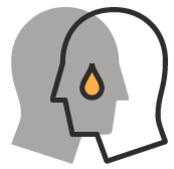
Mental Health Disorders
Many people seek psychoanalytic psychotherapy when a diagnosis of a mental health disorder is tentatively made by a GP or they are formally diagnosed following a psychiatric assessment. Others notice problems in their own behaviour that is sufficient for them to seek help from a professional like a psychoanalytical psychotherapist (perhaps having first googled their symptoms or performed an on line assessment).
Psychiatric diagnoses are based on the categorisation of mental illness according to the Diagnostic and Statistical Manual (the “DSM” published and revised by The American Psychiatric Association). The DSM is a catalogue of diagnostic labels, each defined by a profile of observable behaviours, with the diagnosis made when a certain number of them are fulfilled, e.g. 5 out of 8. Examples of diagnostic labels include:
mood disorders (such as depression or bipolar disorder)
anxiety disorders
personality disorders (psychiatry categorises ten different types of personality disorder)
psychotic disorders (such as schizophrenia)
eating disorders (such as anorexia, bulimia, binge eating disorder etc)
trauma-related disorders (such as post-traumatic stress disorder, developmental trauma etc)
substance abuse disorders
The psychoanalytic psychotherapy approach is less concerned with the diagnostic label and more with the ‘why’. This reflects the complexity of each individual mind and their emotional development which can never be fully described by a single label. This requires getting to know you in order to see and understand what lies within. Together, we establish what protective defences you adapted to deal with trauma, conflicts and loss and how these defences may have become unhealthy for you over time. Uncovering root causes of emotional distress and patterns of behaviour can help you manage their effects, become stronger and lead a more fulfilled life.

Trauma and PTSD
The human mind and body is very complex and sophisticated in its make up. It is a source of wonder and amazement and for the most part, serves us very well. In illness, we tend to become focused on the body’s failings and shortcomings as that is what illness appears to us to be. Terrible things can happen to us in the world. Trauma can result from a single event like an accident, an attack, loss, or it can be a series of events such as physical, mental, emotional or sexual abuse and/or neglect. Trauma can be experienced collectively through racist attacks, cultural and religious conflict, environmental disaster and pandemics. Trauma is believed to be passed on through generations altering thinking, feeling and behaving in the next generation. We have within us, the capacity to experience, recover and learn from catastrophic events. We need to, in order to survive individually and as a race. However, dealing with trauma can change how our body works so that we can become overwhelmed and unable to cope as the threshold of our resources becomes exceeded. We survive the traumatic event but are left struggling with the impact of it. When trauma happens, the sense making part of the brain can be bypassed and the message goes straight to the amygdala, an area deep inside our brains in the primitive limbic system. Here, the memory is not stored in ‘story’ form but as a fragmented experience comprising of images, sounds, smells and other bodily senses. This makes it difficult sometimes for trauma victims to recall what happened or relay it through speech. Yet their body and unconscious mind remember the event(s) through flashbacks, terrors, feeling numb or void and experiencing stress-mediated physical illness. A departure from the body can occur, as it has become a dangerous place to be. You can experience dissociation as a result, losing the ability to connect with your body and inner experiences, leading to pain and depression. There may be unconscious attempts to return to the scene of the trauma by veering towards dangerous situations or re-enacting certain behaviours. Finding expression in a repetition of the same experience and striving to experience a better outcome this time, to do what we wish we could have done the first time, in order to save ourselves or others.
Symptoms such as dissociation, may be triggered by recent events or perceived threats that are a reminder of historical traumatic wounds. Learning to self regulate and get the body out of the orientation, fight or flight and dissociation cycle of reflexes is an important part of the trauma therapy. With time, an understanding of the developmental, social and cultural history of a trauma victim can help to navigate the trauma story . With a carefully structured therapy approach, it is possible to overcome the impact of trauma.

Depression
It is normal to feel down or experience low mood from time to time. Depression is much more than that and can be experienced in different ways by different people. Depression is a serious mood disorder where feeling down, hopeless and helpless lasts for weeks, months, or longer. It can be paralysing at times, when you can’t seem to lift your head off the pillow or get out of bed. You simply can’t hide how you are feeling or perhaps you go to great lengths to keep your suffering hidden. This effort is exhausting on top of the exhaustion of being depressed. Self reproach, anger and guilt are common components of depression as is grandiosity to defend against feelings of worthlessness. All depression tends to have a bi polar aspect to it, where you can go from being really down to moments of feeling good such as after a shopping spree etc.
Depression requires professional help. In psychotherapy, I look at the onset of symptoms and what was happening (or not) at the time the depression started. Through exploration and interpretation, I establish links to past experiences and reconstruct feelings to enable you cope better when similar triggers recur. The effects of this process therefore tend to be more permanent than other forms of treatment.

Anxiety
Anxiety in its ‘normal’ form is part of being human. It helps us to prepare and to perform. It becomes a problem when it persists due to fear that feels real but is not necessarily true. Anxiety in this form, is very common, with 1 in 4 adults suffering from some form of anxiety. Essentially, anxiety involves getting stuck in the normal neurological response to danger i.e. the fight, flight or freeze pathway. In threatening situations, this pathway is activated for a short length of time and is relaxed by another nervous system pathway, once the threat is removed. In anxiety, the body acts as though there is an ongoing threat, triggered by internal, external or environmental events. The pathway that responds to threat remains activated for long periods of time. Anxiety has many forms:
Generalised Anxiety with a wide range of symptoms and non-specific anxiety for long periods of time
Panic, where you are constantly afraid of having another attack
Obsessive Compulsive Disorder (OCD) in which unwelcome, intrusive thoughts constantly appear in your mind, commanding repetitive activities that you feel you must do e.g. repetitive hand washing, tapping, lining up or arranging items in a certain way etc.
Social Anxiety and phobias which trigger anxiety in very specific situations (e.g. fear of being in small spaces, fear of heights, fear of the dark), by animals (e.g. fear of dogs, spiders snakes etc) or by specific objects (e.g. fear of needles). Sometimes just the thought is sufficient to trigger the anxiety.
Post-Traumatic Stress Disorder (PTSD) in which you can feel like you are re living the fear you experienced during a trauma (see also 'Trauma')
The first step in therapy is to learn how to calm an acute attack of anxiety using a method that you find helpful and does not make the anxiety worse. I work cognitively to help you reset and retrain the neurological circuits to modify the perceived threat of a trigger. Together, we can then move on to explore how and why these reactions got set up in the first place with particular focus on early development and unconscious conflict.

Suicide Ideation / Suicidality
It is not unusual for people who are in the depths of despair to contemplate suicide. You cannot bear the chaos, psychological pain and suffering you are experiencing so you seek an escape from it. You may even think about how you might attempt suicide and where. This is called suicide ideation. It does not mean you will go through with it but it does mean you should talk to someone as soon as possible, about how you are feeling. This may be a trusted friend, family member or a helpline in the first instance. They will support you to seek the help of a counsellor or psychotherapist. Here, at Time and Space Psychotherapy, I initially use an assessment and treatment framework such as CAMS (Collaborative Assessment and Management of Suicidality) to help manage your risk and contribute to your own treatment plan. The plan is centred on eliminating suicide as a coping option while focusing on the reasons for living and finding purpose(s) in life. Together, we also work on the underlying reasons you are experiencing such pain.

Mourning / Bereavement
Mourning
Mourning describes the intense sadness or grief that you feel when you lose someone very special to you through death but also when other losses and changes take place e.g. when your marriage, relationship or friendship ends, when you leave your homeland or home, change jobs, lose health or youth, let go of a hope or ideal etc. Death is the ultimate loss and whether expected or sudden, the finality is profound. Each loss can connect you with the pain of past losses. Your grief experience is influenced by your emotional make up and your personal life journey. Therefore, your grief is highly personal, even within the same family, and will progress at your own pace. If full mourning and letting go of a loss takes place, there is always an opportunity for growth and regeneration.
If you feel very alone in your grief or are worried about the course it is taking, I offer a short term, focused therapy to help you come to terms with the loss and pain you are experiencing and how this is affecting you.
Mourning after Suicide
Grief after suicide can be a different experience to regular grief. It tends to be more intense and lasts longer. When you have lost someone to suicide, there are complex emotional, social and cultural issues that can intensify the grief and make it more overwhelming and isolating. You struggle with why they chose to die and why a suicide note, if left, may not help or make sense. There is an overwhelming sense of guilt that you may not have recognised the extent of their suffering, signs of their plan or that you could not have done more to help the person you knew was suffering. It is hard not to feel judged, despite how well meaning people can be. There is a helplessness surrounding suicide. Anger may be directed at all involved in the loved one’s life whom you perceive may have been negligent, including yourself. You may feel anger towards your loved one that they made this choice, left or abandoned you and with such pain. You may fear that other family members, or yourself, will follow suit. A hard feeling to acknowledge may be the feeling of relief, that they are no longer suffering or causing constant worry. Your spiritual or religious beliefs may be challenged. It is important to talk to a counsellor or psychotherapist about what you are feeling and how it is affecting the various aspects of your life. Here at Time and Space Psychotherapy, you are in a safe, confidential, supportive and non-judgemental space where you are free to express yourself, your thoughts and feelings. Then in time, we can explore ways that can help you come to terms with what you are feeling and re frame feelings like guilt, so they are less overwhelming. When you are ready, we will work at the importance of forgiveness.
Complicated Mourning
Complicated grief happens when you cannot mourn or fully mourn a loss, when you cannot do the emotional work required to let a person go. Grief is prolonged, delayed, exaggerated or masked such that:
• You don’t have any grief responses
• You have grief responses that are excessive, distorted or never
ending
• Your ability to function physically and psychologically may be
compromised
Cultural influences can impact the mourning process such as the expectation and praise of stoicism, that can predispose to delayed or complicated mourning. In therapy, we aim to identify when and why the grief became complicated, unravel unconscious links and associations so that in time, you can progress through mourning.

Relationship Difficulties
Relationships are central to how you function as a human whether the relationship be parental, sibling, spouse, partner, child, mentor, pupil, colleague, friend. The patterns of how you relate are set up early in life and are dependent on how you were related to. This can be complex and variable between individuals. When there are difficulties in a relationship, it can throw you into turmoil. You find it hard to negotiate them on a daily basis. When the difficulties are of a violent nature, seeking help is critical for all concerned.
Here at Time and Space Psychotherapy, we explore your relationship patterns and the experiences that shaped them. By getting to the roots of behaviour patterns, you have the opportunity to understand how they affect you relating to yourself, to others and how you may have ended up in bad situations. You have the opportunity to resolve conflicts that you find there and come to a deep reconciliation within yourself that facilitates better relationship behaviours and choices.

Sexuality
Sexual orientation and issues around sexual intimacy and dysfunction are topics that many people find it very difficult to talk about. You may be suffering alone with feelings of shame, frustration, low self-esteem, often becoming depressed and isolated. It is an area where cultural influences and taboos have a major impact.
Here at Time and Space Psychotherapy, the safe, non-judgemental space created allows you to talk about your struggle without fear. I can help clarify the various aspects of the difficulties experienced and find out what might be contributing to them.

Illness
As well as looking after those with a mental illness or mental health issues, looking after the client who has had a medical or genetic diagnosis is something I specialise in, here at Time and Space Psychotherapy. This also extends to those who are coming to terms with these diagnoses in family members or friends and to the professionals and carers that look after them.

Skin Disorders
Suffering from eczema, atopic dermatitis, psoriasis, urticaria, acne, effluvium?
Dermatology is probably the leading medical specialty that advocates a medical and psychological approach to the treatment of skin disorders. Irrespective of the origin of the skin disorder, dermatologists acknowledge the talking therapies as part of the treatment, particularly the psychoanalytic approach which I use here at Time and Space Psychotherapy.

Addiction
Has a particular substance, activity or behaviour become central to your life to the exclusion of everything else? Is it harming you (or others) physically, mentally or socially? If so, then you may have an addiction. Typically these include:
Alcohol and drugs (nicotine, prescription drugs, over the counter drugs, recreational and hard drugs).
Gambling
Sex
Food
Gaming
Work
Shopping
I work psychoanalytically with how compulsions work. As a symptom, they can both express and hide an emotion, the conflict of which can leave you emotionally flat. The psychoanalytic approach over time can help you bear the anxiety of feeling an emotion consciously, thereby reducing or eliminating the need to return to the compulsion.

Workplace Issues
The workplace has become increasingly demanding and busy not to mention the challenges of getting to and from there. It is not surprising that difficulties arise from struggling to cope with the demands and can lead to deterioration in interpersonal relationships. Despite the ready availability of detailed anti-bullying policies, bullying still seems to thrive in the workplace. It particularly thrives at difficult times such as during a recession or an organisation merger, where it can revolve around the attitude of “you are lucky to have a job.” Many organisations have invested heavily in supporting mental health and wellbeing for their staff. This is not within the capacity of all organisations and staff must seek their own help.
With a long history of working within a large organisation to management level, being on the board of a number of professional bodies, working as a mediator and an employee assistance programme (EAP) counsellor, there is very little I have not come across. As a result, I can offer short term, focused, support for those experiencing difficulties in the workplace. We first deal with the personal and professional impact and then explore manageable ways you can negotiate this. I support organisations by providing competitively priced, talks, workshops and consultations on site, at agreed intervals, depending on need and budget.
Please contact me to see how I can help You!
To book a consultation use the link below or call me on 086 8114757
My client focus is adults

